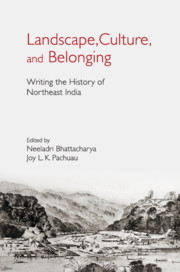Book contents
- Frontmatter
- Contents
- List of Figures
- Acknowledgements
- Introduction
- I Borders and Beyond
- II Surveys and Explorations
- III Ethnography, History, and the Politics of Representation
- IV Law, State, and Practices of Governance
- 8 Frontier Regime and Colonial Rule
- 9 The Law of Emptiness: Episodes from Lushai and Chin Hills (1890–98)
- 10 The Colonial State and the ‘Illegal’ Arms Trade along the North-East Frontier of India, 1860s to 1900s
- V Cultural Dialogues
- Notes on Contributors
- Index
10 - The Colonial State and the ‘Illegal’ Arms Trade along the North-East Frontier of India, 1860s to 1900s
from IV - Law, State, and Practices of Governance
Published online by Cambridge University Press: 26 April 2019
- Frontmatter
- Contents
- List of Figures
- Acknowledgements
- Introduction
- I Borders and Beyond
- II Surveys and Explorations
- III Ethnography, History, and the Politics of Representation
- IV Law, State, and Practices of Governance
- 8 Frontier Regime and Colonial Rule
- 9 The Law of Emptiness: Episodes from Lushai and Chin Hills (1890–98)
- 10 The Colonial State and the ‘Illegal’ Arms Trade along the North-East Frontier of India, 1860s to 1900s
- V Cultural Dialogues
- Notes on Contributors
- Index
Summary
In June 1863, a few muskets began to appear among the Kukis of the Chittagong Hill Tracts. This was a cause of worry for Captain G. M. Graham, the Superintendent of the Chittagong Hill Tracts. As the official directly concerned with the political administration of the frontier tribes, he was well aware of the implications of any change in the hill peoples’ arsenals. The ‘discovery’ prompted considerable speculation about the possible source of supply. Careful enquiries by Graham and Colonel Arthur Purves Phayre, Chief Commissioner of British Burma, confirmed that the firearms circulating amongst the Kukis came through the territory of Arracan. To block this ‘pernicious trade’, the British pushed for rigorous surveillance and blockading measures whereby ‘a close watch’ was ‘to be kept on all native vessels entering the bays and rivers on the coast of Arracan’, including Cox Bazaar, where ‘a trade in arms and ammunition was carried on with the view of supplying the hill tribes’.
Colonial attempts to control frontier geographies against the flow of ‘illegal’ firearms, however, often proved ineffective, as the state's interdiction capabilities were limited here. Firearms moved not just through one or two corridors but through many tracks and routes along the frontier. In fact, the period between the 1860s and 1900s saw the gradual spread of firearms along the north-east frontier, reaching, in addition to the Kukis, the Lushais, Shendus, Khasis, Nagas, and the Chins. This chapter seeks to examine the significance of the ‘illegal’ firearms trade along the north-east frontier of the British Raj. It will explore not just the challenges but also the new opportunities, which this ‘illegal’ traffic in firearms opened for the colonial state and its subjects. It will also examine some of the factors that contributed to the growth and demand for firearms in the frontier, the role of various actors involved in this trade, and the various strategies employed by the colonial state to contain this ‘illegal’ trade in firearms. The chapter will also explore how various actors involved in this trade found new opportunities when new ‘borders’ were imposed and prohibitive laws were introduced, and took advantage of the loopholes in colonial institutional frameworks along the frontier.
- Type
- Chapter
- Information
- Landscape, Culture, and BelongingWriting the History of Northeast India, pp. 237 - 262Publisher: Cambridge University PressPrint publication year: 2019



